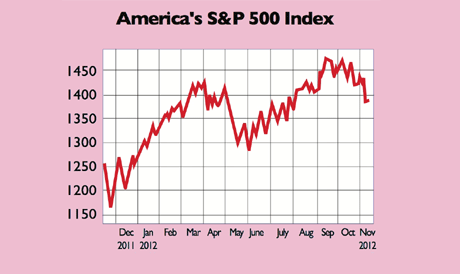
After last week’s decisive presidential election, investors immediately started to have “palpitations about the US fiscal cliff”, says James Mackintosh in the Financial Times. The Dow Jones index slid by over 2% last week, its worst weekly showing since June. The S&P 500 has slid to a three-month low, and its UK counterpart, the FTSE 100, has fallen to a six-week low.
The package of tax hikes and spending cuts that kicks in on 1 January if Congress can’t agree a new deal could cut GDP growth by up to 4%. A US, and hence global, recession is likely to follow.
Investors remembered that “the same people that took the US to the brink of… default in 2011 will be the ones dealing with the fiscal cliff”, says Chris Iggo of Axa Investment Managers.
Even if, as most observers assume, there is a compromise to avoid the fiscal cliff, the “unsustainable budget deficit” would remain, as Randall W Forsyth points out in Barron’s – and tackling that “wouldn’t be painless”. It seems that a fiscal squeeze dampening economic momentum is on the cards in any case.
As far as the near future is concerned, investors should remember that politicians only tend to get their act together once Wall Street has been hit quite badly, adds Forsyth. The debt-ceiling standoff last summer led to a nasty plunge in the S&P 500 and the same happened in September 2008 when the House of Representatives initially rejected the bail-out bill. Chances are we will only get some action once markets have sunk further.
Equity markets’ problems extend beyond the fiscal cliff. “There is not much left in the tank” when it comes to US earnings, says Stephen Massocca of Wedbush Morgan. Margins are at historic highs and economic growth has ebbed.
Meanwhile, a chaotic Greek exit from the eurozone remains a possibility and Spain, though it has raised all the money it needs from the markets in 2012, looks virtually certain to need an official bail-out early next year.
To make matters worse, the weakness in the European periphery has now infected the core. European Central Bank President Mario Draghi noted last week that even regional powerhouse Germany was feeling the impact of the continent’s downturn.
Economic momentum in Asia has also slowed. Given all this, it looks unwise to count on markets’ traditional Santa Claus rally this year.